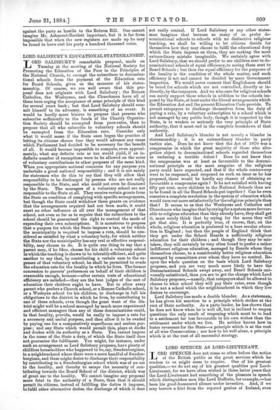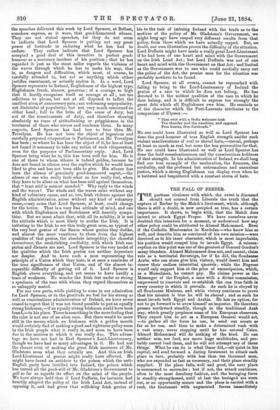LORD SPENCER AS LORD-LIEUTENANT.
TjORD SPENCER does not come so often before the notice of the British public as the great services which he renders to us might seem to require. One of his greatest qualities,—we do not say of his greatest qualities qua Lord- Lieutenant, for we have often wished in these latter years that the Lord-Lieutenant had something of the pleasure in speech which distinguishes men like Lord Dufferin, for example,—has been his good-humoured silence under invective. And, if we may borrow a hint from the reputed genius of Ireland, even the speeches delivered this week by Lord Spencer, at Belfast, somehow express, as it were, that good-humoured silence. They are not stoical speeches, for they do not seem to indicate that Lord Spencer is putting out any great power of fortitude in enduring what he has had to endure. They rather indicate that Lord Spencer has accepted a good deal of this invective in perfect good- humour as a necessary incident of his position ; that he has regarded it just as the stout sailor regards the violence of the waves through which he has to make his way, that le, as dangers and difficulties, which must, of course, be carefully attended to, but not as anything which either justifies resentment, or actually excites it. In a word, Lord Spencer represents to Ireland, Englishmen of the highest type, Englishmen frank, sincere, generous ; of a courage so high that it hardly recognises itself as courage at all ; not too solicitous to please, but not at all disposed to inflict the smallest atom of unnecessary pain ; not welcoming unpopularity, not disdainful of popularity, but not very much concerned on either head ; full to the brim of the sense of duty, bat not of the consciousness of duty, and therefore showing absolutely no trace of attitudinising or priggishness in the treatment of those who accuse and condemn them. In many respects, Lord Spencer has had less to bear than Mr. Trevelyan. He has not been the object of ingenious and carefully prepared vituperation in Parliament, as Mr. Trevelyan has been ; or where he has been the object of it, he has at least not found it necessary to take any notice of such vituperation, even for the purposes of Parliamentary reply. And, Lord Spencer being what he is, this has been well for him. He is one of those to whom 'silence is indeed golden, because he does not brood in silence over the replies which he would have liked to give and has not been able to give. His silence has been the silence of genuinely good-humoured regret,—the silence of one who really feels what so few really feel, when they have to be silent on what has been said against themselves, that " least said is soonest mended." Why reply to the winds and the waves f The winds and the waves arise without any kind of voluntary cause, and so, too, Irish violence against the English administration arises without any kind of voluntary cause,—any cause that Lord Spencer, at least, could change for the better. That is a very fine attitude of mind, and one with which Englishmen and Scotchmen will heartily sympa- thise. Bat we must admit that, with all its nobility, it is not the attitude which is most likely to soothe the Irish. It is irritating to the Irish to see this truly great man, so typical of the very best genius of the Saxon whose genius they dislike, and almost the more vexatious to them from the highest qualities of that genius, the absolute intrepidity, the cheerful insouciance, the unshrinking cordiality, with which Irish sus- picion and distaste are met. Lord Spencer is the very model of the qualities which the Irish genius can neither depreciate nor despise. And to have such a man representing the principle of a Union which they hate, is at once a reminder of the true significance of that Union, and of the almost in- superable difficulty of getting rid of it. Lord Spencer is English above everything, and yet seems to have hardly a trace of weakness. No wonder the Irish fret under so strong a specimen of the race with whom they regard themselves as so unhappily mated.
For our own parts, while yielding to none in our admiration for Lord Spencer, or in the gratitude we feel for his strong as well as conscientious administration of Ireland, we have never ceased to regret that it was not found possible to put an equally strong Irishman —if an equally strong Irishman could have been found,—in his Place. There is something in the mere feeling that the ruler is not one of an alien race. But there would be more still in the means which an Irishman with a golden mouth would certainly find of making a good and righteous policy seem to the Irish people what it really is, and seem to have been due to the motives to which it was really due. This advan- tage we have not had in Earl Spencer's Lord-Lieutenancy, though we have had so many advantages in it. He had not the chance even of making the great Irish measures of Mr. Gladstone seem what they actually are. And this an Irish Lord-Lieutenant of genius might really have effected. He might have found an antidote to the poison which the anti- English party have instilled into Ireland, the poison which has turned all the good-will of Mr. Gladstone's Government to gall so far as regards its effect on the mind of the people. We have always held that if Lord Dufferin, for instance, had heartily adopted the policy of the Irish Land Act, instead of opposing it, and had given that rollicking Irish genius of his to the task of imbuing Ireland with the truth as to the motives of the policy of Mr. Gladstone's Government, we Might long ago have reaped very different results from that policy, from those which we have actually reaped. But, no doubt, our own illustration proves the difficulty of the situation. Lord Dufferin might have made a really great Lord-Lieutenant if he had been of one heart and mind with the Government on the Irish Land Act ; but Lord Dufferin was not of one heart and mind with the Governinent on that Act ; and limited as the Government was to one who could cordially carry out the policy of the Act, the precise man for the situation was probably nowhere to be found.
Lord Spencer, at all events, cannot be reproached with failing to bring to the Lord-Lieutenancy of Ireland the genius of a race to which he does not belong. He has devoted to it the noblest qualities of the race to which he does belong, and it is difficult to express too strongly the great debt which all Englishmen owe him. He reminds us of the character which the Poet-Laureate attributes to the companions of Ulysses :- " That ever with a frolic welcome took
The thunder and the sunshine, and opposed Free hearts, free foreheads."
No one could have illustrated so well as Lord Spencer has done the good-humour of true English strength amidst such violent manifestations of real.or unreal hate,—unreal, perhaps at least as much as real, but none the less provocative for that. No one could have illustrated so well as Lord Spencer has done the bold conscientiousness and the conscientious boldness of that strength. In his administration of Ireland we shall long find our best example of the moderation, the firmness, the cordiality, and the profound but untremulous and unanxiona justice, which a. strong Englishman can display even when he is battered and bespattered with a constant storm of hate.



































 Previous page
Previous page